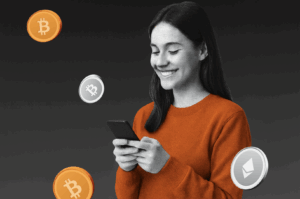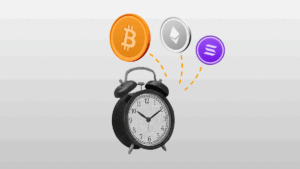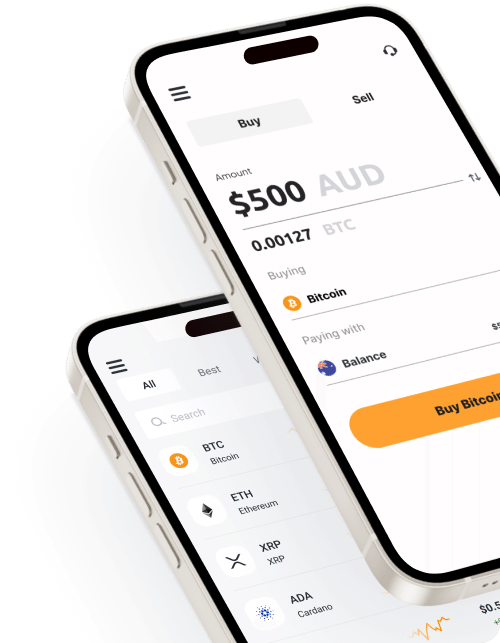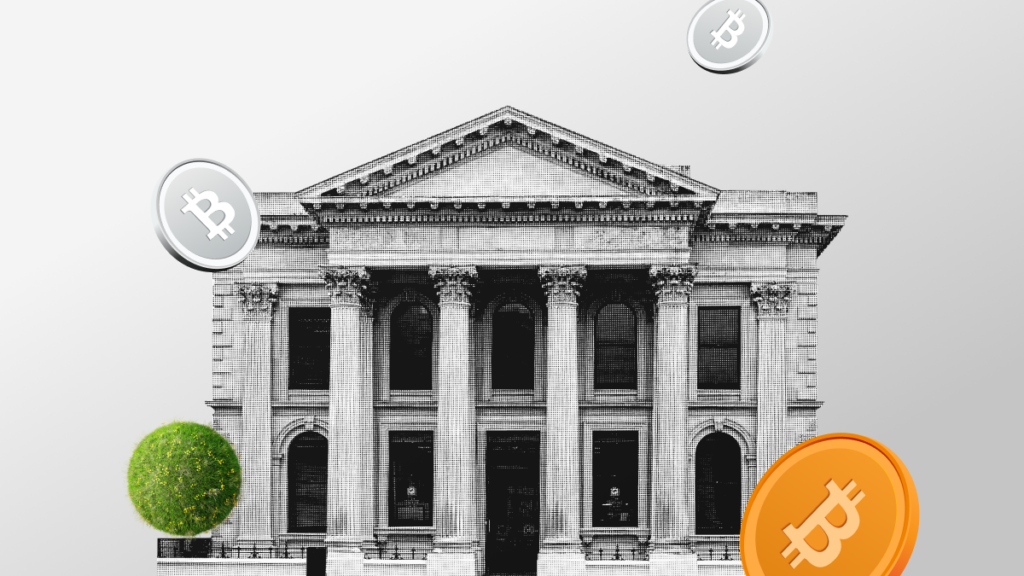
There are two main types of crypto exchanges: centralised (CEX) and decentralised (DEX). In this blog, we’re breaking down centralised vs. decentralised crypto exchanges—what they are, how they work, and the pros and cons of each.
Not sure which one’s right for you? Keep reading below.
Centralised exchanges (CEX)
Centralised crypto exchanges (CEXs) are trading platforms managed by companies or central authorities, which makes trading straightforward. They connect buyers and sellers as trusted intermediaries in every trade.
Much like how a bank protects your money, CEXs safeguard your crypto. They do this by managing users’ crypto wallets and private keys — the unique codes that prove ownership and authorise transactions. By taking on this role, exchanges help secure funds, process trades, and provide easy account access.
Because CEXs have custody of user assets, they have to comply with regulations like Know Your Customer (KYC) and Anti-Money Laundering (AML) laws. These rules require identity verification to prevent fraud and support a safer trading environment.
In Australia, leading CEXs include bitcoin.com.au (which has operated for the last 11 years), Independent Reserve, Binance, CoinSpot, and Cointree.

Advantages of a centralised exchange
Simple and beginner-friendly
If you’re new to crypto, using a centralised exchange (CEX) is the easiest way to get started. They offer easy-to-use interfaces, 24/7 customer support, and — importantly — account recovery options. Ever forgotten a password? On a CEX, you can reset it in minutes.
On the other hand, if you lose your private keys with decentralised exchanges (DEXs), you’ve likely lost access to your funds for good.
This simplicity makes CEXs an attractive option for users unfamiliar with the more techy side of crypto – such as private keys and navigating blockchain networks.
Easy crypto purchasing with Aussie dollars
Aside from being the more straightforward option, Australian CEXs also let you buy crypto with Aussie dollars. The best ones offer plenty of deposit options, including bank transfers, PayPal, and credit/debit cards. This means you can go from dollars to Bitcoin in just a few clicks. And, when you’re ready to sell, you can easily withdraw your Aussie dollars back into your bank account.
On the other hand, decentralised exchanges (DEXs) generally only support crypto-to-crypto trades. So, if you’re starting with Aussie dollars, you’ll need to use a CEX — or a third-party service like MoonPay or Ramp — before you can even begin investing.
Regulated and secure
Another major advantage of CEXs is compliance, especially when Australian regulators are suspending and refusing to register non-compliant exchanges. The main rules that CEXs follow are aimed at ensuring users’ identities are verified (KYC), and that suspicious transactions are monitored to help prevent fraud and scams. This means a safer and more trustworthy place to buy and sell crypto.
Reputable CEXs also proactively implement advanced security measures to safeguard user assets, including:
- Two-factor authentication (2FA) for added security.
- Cold storage to keep most funds offline and safe from hackers.
- Regular security audits to catch and fix vulnerabilities.
Disadvantages of CEXs
Management risks
Like banks and other financial institutions, CEXs hold user funds, which means that those funds may be at risk if the CEX is poorly managed. While rare, history has shown that mismanagement can have serious consequences.
Take FTX’s collapse in 2022—it exposed major misuse of customer funds and sent shockwaves through the crypto industry. To stay safe, look for exchanges that keep client funds separate from company assets without relying on third parties.
Security risks
Because CEXs store crypto, personal data, and funds in one place, this can make them targets for hackers. While top-tier exchanges invest heavily in security, breaches have happened — like when the Japanese firm Mt. Gox was hacked in 2014, which saw millions in Bitcoin stolen.
DEXs, on the other hand, tend to be less vulnerable to centralised attacks. That said, they still come with their own risks — like vulnerabilities to their underlying code (think SushiSwap’s 2021 hack). To reduce risk, choose CEXs with industry-leading security and strong account protection.
Less privacy
Since CEXs follow KYC (Know Your Customer) and AML (Anti-Money Laundering) rules, transactions on their platform are traceable, and personal information may be shared with authorities when required. If you prefer to trade without identity verification or government oversight, this can be a drawback.
DEXs offer greater privacy since they don’t require KYC. But keep in mind — blockchain transactions aren’t fully anonymous. Wallet addresses are visible and can sometimes be linked back to real identities.
Plus, if you ever need to convert crypto to cash, you’ll likely need to use a CEX or a third-party payment service — both of which usually require KYC/AML.
Decentralised exchanges (DEX)
A decentralised exchange (DEX) is a crypto marketplace where users trade directly from their own crypto wallets—without relying on a middleman to hold funds or process transactions. This gives users full control over their assets and enhances privacy.
Even though the idea behind DEXs is full decentralisation, most of them actually start with a small core team before gradually shifting to a more community-driven model. Take Uniswap, for instance — it was built by Hayden Adams, who had investor backing to get things off the ground. Meanwhile, SushiSwap took a different route, launching anonymously under the alias Chef Nomi, which stirred up quite a bit of controversy at the time.
To trade on a DEX, you connect your personal crypto wallet (like MetaMask or Trust Wallet) to the platform. Since no third party holds your funds, you’re fully responsible for securing your assets. This means more control and privacy — but it also requires a solid understanding of private keys, blockchain networks, and transaction management.
DEXs are widely accessible in Australia, but they aren’t headquartered in any single country because they run on global blockchain networks. Some examples include Uniswap, Jupiter, and SundaeSwap.
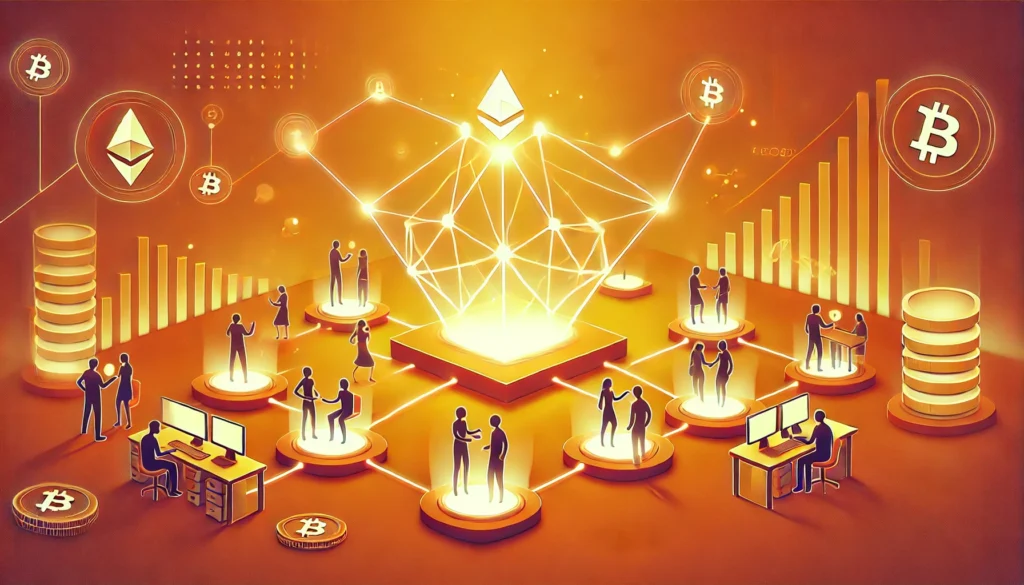
Advantages of decentralised exchanges
Access to new and small-cap tokens
Since decentralised crypto exchanges (DEXs) tend to operate without strict oversight, it’s easier for new projects to list their tokens (including Hawk Tuah, and Tipsy Santa coins). Platforms like Uniswap and PancakeSwap support thousands of cryptocurrencies, giving users access to a lot of less established crypto — including early-stage projects that might not yet be available on centralised exchanges (CEXs).
Often, these tokens start trading at lower prices on DEXs before gaining visibility and potentially rising in value once they hit CEXs.
More DeFi opportunities
DEXs don’t just offer token trading — they also provide access to a wider range of more advanced decentralised finance (DeFi) opportunities. For example, some DeFi platforms hand out their own tokens as rewards — a bit like loyalty points. Users can earn them by providing liquidity (depositing crypto into a funding pool to help trades happen smoothly) or staking (locking up tokens to support the network and earn rewards).
These tokens can then be traded, held, or used for various benefits, giving people a way to earn beyond just buying and selling crypto.
PancakeSwap, for instance, allows users to add liquidity to pools and earn a share of trading fees, along with additional rewards in the form of CAKE tokens.
Control and governance
Unlike centralised exchanges, most DEXs don’t require Know Your Customer (KYC) verification, meaning users can trade without restrictions. This enhances financial autonomy and makes it much harder for accounts to be frozen or transactions to be censored.
Some DEXs also issue governance tokens, giving users a say in important protocol decisions, such as fee structures and system upgrades. While the level of influence varies, this community-driven approach appeals to those who prefer decentralisation over centralised control.
Disadvantages of DEXs
Less user-friendly
While a DEX gives full control over your crypto, this control comes with additional responsibility and risk. Ever lose your private keys or hardware wallet? There’s no reset button for a DEX, so your funds could be gone forever on that wallet.
In contrast, centralised exchanges (CEXs) offer account recovery, so losing a password doesn’t mean losing access. Plus, CEX customer support can help with security issues.
DEXs also require a deeper understanding of blockchain technology and wallet management. Simple mistakes — like sending funds to the wrong blockchain address — can also be irreversible. And since platforms like Uniswap don’t have traditional customer service, users have to rely on community forums, online guides, and documentation for troubleshooting.
Token risks
As discussed above, one of the biggest draws of DEXs is access to thousands of tokens – but that comes with risks. Since anyone can list a token, scams and low-quality projects are more common.
A major example? The Squid Game (SQUID) token, where developers blocked selling and vanished with over $7.4 million of investor funds. This is a type of common scam called a “rug pull” (i.e., pulling the rug from under you), where developers suddenly remove crypto and funds from a project and disappear.
Some DEXs are improving token security. For example, PancakeSwap offers verified token badges, and some platforms use governance models to vet projects. But these safeguards aren’t foolproof — so always do your own research before trading new or lesser-known tokens.
Regulatory risks
DEXs operate outside traditional regulatory frameworks, which means users can trade anonymously. While this offers privacy, it also raises concerns about non-compliant and illegal tokens.
CEXs, on the other hand, must follow strict regulations to protect investors and prevent financial crime. In Australia, for example, privacy coins are excluded from CEX listings due to anti-money laundering laws. This helps keep exchanges compliant and protects users from potential legal risks.
In Australia, regulators like ASIC and AUSTRAC are starting to tighten oversight on digital assets, which could impact DEXs in the future. So, while DEXs operate with relative freedom, growing regulatory pressure could change that over time.
How to select the right crypto exchange for you
When choosing between centralised versus decentralised crypto exchanges, consider the following:
- Reputation & security: Check the exchange’s history, reviews, and security measures like two-factor authentication (2FA) and cold storage.
- Regulatory compliance: Ensure the exchange is licensed and follows local regulations.
- Fees: Compare trading, withdrawal, and other fees.
- Support when you need it: Look for an easy-to-use platform with quality customer support.
- Deposit & withdrawal: Confirm the available transfer methods, such as credit and debit card, bank transfers and PayPal.
- Transparency: Look for exchanges that are upfront about their team, processes, and how they keep your funds safe.
- Trading pairs: Make sure that the exchange supports the pairs you want to trade.
- Liquidity: Check to ensure that the exchange has enough funds, which allows for quick trades at fair prices.
Centralised v decentralised crypto exchanges: key feature summary
We’ve put together a brief table to help compare the key differences between centralised versus decentralised crypto exchanges:
| Feature | Centralised exchange (CEX) | Decentralised exchange (DEX) |
| Ease of use | Easy to use with customer support and account recovery. Good for beginners. | More complex, generally requiring knowledge of wallets and blockchain. Some DEXs are easier than others. |
| Deposits & Withdrawals | Accept Aussie dollars through bank transfers, PayPal, or credit/debit cards, allowing easy buying and selling of crypto. | Typically handles only crypto; converting to or from AUD often requires additional steps using other services. |
| Trading features | Some offer features like multi-user accounts, and over-the-counter (OTC) trading desks for larger and more complex trades. | May have fewer trading features; some platforms offer only basic token swaps. |
| Fees | Often charge simple, fixed fees for trading and withdrawals. | Fees vary based on network activity and can be unpredictable; costs can rise sharply during busy times. |
| Regulation | Identity verification is required to comply with Australian financial laws. | Less regulated and doesn’t require the same levels of identity verification. |
| Security | Strong security measures like two-factor authentication (2FA) and cold storage. However, because CEXs store user funds centrally (in exchange-controlled wallets), they can be a more attractive target for hackers. This is why reputation and trust in the platform are important. | Since DEXs don’t hold user funds — trades happen directly from users’ wallets. This reduces central attack points. However, users face higher risks from coding bugs, phishing scams, and lost private keys, which can lead to irreversible losses. |
How to register with a crypto exchange
Whether you’re an individual or representing a company, trust or SMSF, we’ve got you covered in Australia. Click here to sign up.
Frequently asked questions
What fees do crypto exchanges charge?
Crypto exchanges charge fees for deposits, withdrawals, and trades. Deposit fees vary by method, while withdrawal fees often depend on the asset or blockchain. Learn more here.
How does bitcoin.com.au ensure safety?
bitcoin.com.au employs employs enterprise-grade measures, such as an ultra-secure offline cold storage with an insured, enterprise-grade Qualified Custodian, for the majority of digital assets, two-factor authentication (2FA), and regular third-party security audits to minimise risk. The exchange is also a member of the Digital Economy Council of Australia (DECA; formerly named Blockchain Australia), demonstrating its commitment to industry best practices and responsible growth.
How do I choose between a CEX and a DEX?
When choosing between centralised versus decentralised crypto exchanges, check its reputation and security features, like two-factor authentication and cold storage. Compare fees, deposit, and withdrawal options, such as bank transfers or PayPal, to find what works best for you.
Assess the platform’s ease of use, trading tools, and liquidity to ensure smooth and efficient trading. Lastly, ensure the exchange has responsive customer support, and provides clear information about its processes, infrastructure and security.
Learn more about choosing the right crypto exchange.
Which is safer: a centralised or decentralised exchange?
Centralised crypto exchanges (CEXs) provide stronger compliance and regulatory protections, making them safer from illegal activity. Decentralised exchanges (DEXs) avoid centralised risks. However, DEX self-custody requirements and reliance on user-managed wallets increase the risk of losing funds through errors.
